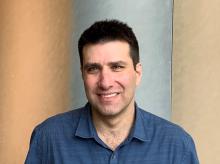The Crown Family School Welcomes Assistant Professor Aaron Gottlieb

A Joyce Foundation grant, award-winning research, quantitative analysis skills, community involvement, and a dedication to teaching are key strengths that Aaron Gottlieb brings to his new faculty appointment at the University of Chicago Crown Family School of Social Work, Policy, and Practice.
Formerly a faculty member of the Jane Addams College of Social Work at the University of Illinois Chicago, Gottlieb joined the University of Chicago as an assistant professor at the start of the 2022-23 school year.
“The amazing faculty that are doing such incredible, leading social work research was attractive to me,” he said. “The Crown Family School has people doing research in a lot of different areas, using a lot of different approaches. Being exposed to all those different approaches and areas will sharpen my work.”
Gottlieb applies quantitative methods to research in decarceration and other issues of criminal legal involvement. A New York native, he engaged with these topics after seeing the way a system of privilege that had benefited him also harmed people with fewer advantages.
“That sense of unfairness really hit home. Once you see it, you can’t unsee it,” Gottlieb said.
This quarter Gottlieb is teaching Social Intervention: Programs and Policies I.
“People often come to social work more focused on clinical work and not necessarily thinking they’re going to be doing policy. The class offers the opportunity to open people’s minds and expose them to something different.”
Next quarter he will teach a statistics course for doctoral students.
“I have always enjoyed mentoring doctoral students and I’m excited to help shape how they think about quantitative research.”
Media outlets such as The New York Times and The Atlantic have cited Gottlieb’s work. Last January, he and his co-author received the 2022 Frank R. Breul Memorial Prize from Social Service Review for “The Legacy of Slavery and Mass Incarceration: Evidence from Felony Case Outcomes Today.” The article shows how bad outcomes can result when the long arm of the law becomes entrained in the subtly flowing sands of time.
“The authors examine for the first time the likelihood that individuals charged with crimes in counties with high levels of slavery historically experience worse-case outcomes,” editor and Crown Family School Associate Professor Jennifer Mosley wrote in the Breul Prize announcement. “Their sophisticated data collection and analysis shows that such individuals are at significantly higher risk for pretrial detention, a sentence of incarceration, and long prison sentences than their counterparts in counties with lower levels of slavery historically.”
The study, among others, shows that history matters, Gottlieb said.
“Even if you think we’ve eliminated contemporary racism, which I don’t believe, that doesn’t mean historical structures are not still shaping people’s opportunities today. Clearly, they are.”
Gottlieb continues his research with a grant from the Joyce Foundation that helps fund his new Resource Reallocation Lab at UChicago.
“I’ve been able to hire 11 new students,” Gottlieb said, adding to the two he already had. “That is thanks, in part, to the resources here at the Crown Family School and the University of Chicago.”
His team is collecting data on how local governments in the Great Lakes region’s 50 most populous counties have spent their resources over the last decade on activities such as policing and incarceration as compared to community investments, like housing, education and health.
Once the team has collected all the data, he plans to assess how these allocations have impacted outcomes ranging from gun and police violence to health and education.
Gottlieb has grappled with such issues outside of academia as an appointee to Chicago’s Police Use of Force Work Group in 2020. He also has worked with Chicago community groups to advocate for the Empowering Communities for Public Safety Ordinance, which the city council passed in July 2021. More work remains to be done.
“I hope my advocacy around policing helps lead to change so that that our institutions better serve all communities in Chicago.”